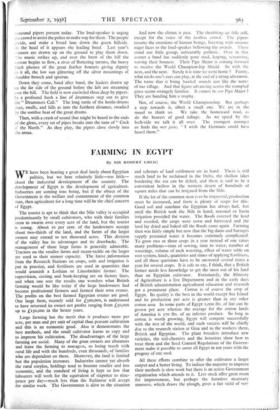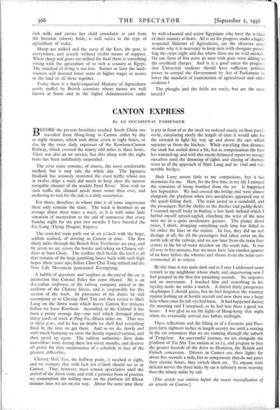FARMING IN EGYPT
By SIR ROBERT GREIG
WE have been hearing a great deal lately about Egyptian politics, but we hear relatively little—too little— about the industrial development cff the country. The development of Egypt is the development of agriculture. Industries are coming into being, but if the object of the Government is the welfare and contentment of the common man, then agriculture for a long time will be the chief concern of Egypt.
The tourist is apt to think that the Nile valley is occupied predominantly by small cultivators, who with their families seem to swarm over every acre of the land, but the tourist is wrong. About ro per cent. of the landowners occupy about two-thirds of the land, and the farms of the larger owners may extend to ten thousand acres. This division of the valley has its advantages and its drawbacks. The management of these large farms is generally admirable. Tractors on the smaller farms and steam-tackle on the larger are used to their utmost capacity. The latest information from the Research Stations on crops, soils and irrigation is put in practice, and fertilisers are used in quantities that would astonish a Lothian or Lincolnshire farmer. The supervision, costing and book-keeping are on factory lines, and when one sees the results one wonders what British farming would be like today if the large landowners had become professional farmers and farmed their own estates. The profits on the best farmed Egyptian estates are good. One large farm, recently sold for L5oo,000, is understood to have returned its owner net profits ranging from L5o,00o up to Dt50,000 in the better years.
Large farming has the merit that it produces more per acre, per man and per unit of capital than peasant cultivation and this is an economic good. Also it demonstrates the best methods, and the small cultivator learns to copy and to improve his cultivation. The disadvantages of the large farming are social. Many of the great owners are absentees and leave the farming to managers, so losing touch with rural life and with the hundreds, even thousands, of families who are dependent on them. Moreover, the land is limited but the population increases. Industries cannot yet absorb the rural surplus, holdings tend to become smaller and less economic, and the standard of living is kept so low that labourers will work for the equivalent of sixpence to nine- pence per day—much less than the Sudanese will accept for similar work. The Government is alive to the situation and schemes of land settlement are in hand. There is still much land to be reclaimed in the Delta, the shallow lakes bordering the sea can be dykcd, and there is said to be a convenient hollow in the western desert of hundreds of square miles that can be irrigated from the Nile.
If the lot of the common man is to be improved, production must be increased, and there is plenty of scope for this. Good soil and sunshine the Egyptian has always had, but until the British took the Nile in hand, seasonal or basin irrigation provided the water. The floods covered the land and receded, the crops were sown and harvested and the land lay dried and baked till the floods came again. Farming then was fairly simple but now that the big dams and barrages supply perennial water it becomes extremely complicated. To grow two or three crops in a year instead of one raises many problems—time of sowing, time to water, number of waterings, volume of each watering, effect of water table on root system, kinds, quantities and times of applying fertilisers, and all these questions have to be answered several times a year for several crops. It is safe to say, I think, that a British farmer needs less knowledge to get the most out of his land than an Egyptian cultivator. Fortunately, the Ministry of Agriculture is a live Department and in the early days of British administration agricultural education and research got a prominent place. Cotton is of course the crop of Egypt. Its quality is the best in the world except Sea Island and its production per acre is greater than in any other cotton area. In some parts of Egypt r,000 lbs. of lint can be grown per acre whereas the average for the cotton lands of America is 170 lbs. of an inferior product. So long as cotton is worth growing, Egypt will compete successfully with the rest of the world, and such success will be chiefly due to the research station at Giza and to the workers there, British and Egyptian. The plant breeders introduce new varieties, the soil-chemists and the botanists show how to treat them and the Seed Control Regulations of the Govern- ment make it possible to cover all Egypt in ten years with the progeny of one seed.
All these efforts combine to offer the cultivator a larger output and a better living. To induce the majority to improve their methods is slow work but there is an active Government organisation which attends to it. Live stock offer great room for improvement, but perhaps the harmless necessary gamoose, which draws the plough, gives a fair yield of ver, rich milk, and carries her child attendants to and from the berseem (clover) fields, is well suited to the type of agriculture of today.
Sheep are milked and the curse of the East, the goat, is everywhere, and usually without visible means of support. When sheep and goats are milked for food there is something wrong with the agriculture of so rich a country as Egypt. The standard of living is too low. Sooner or later the land- workers will demand lower rents or higher wages or access to the land or all three together.
Today there is a finely-organised Ministry of Agriculture partly staffed by British scientists whose names are well known at home and in the higher Administrative ranks by well-educated and active Egyptians who have the welfare of their country at heart. All is set for progress under a highly respected Minister of Agriculture, yet the observer must wonder why it is necessary to keep men with shotguns patrol- ling the crops night and day where there are no wild animals. On one farm of 80o acres 3o men with guns were adding to the overhead charges. And is it a good omen for progress that University students should have sufficient political power to compel the Govemment by Act of Parliament to lower the standard of examination of agricultural and other students ?
The ploughs and the fields are ready, but are the oxen tamed ?







































 Previous page
Previous page